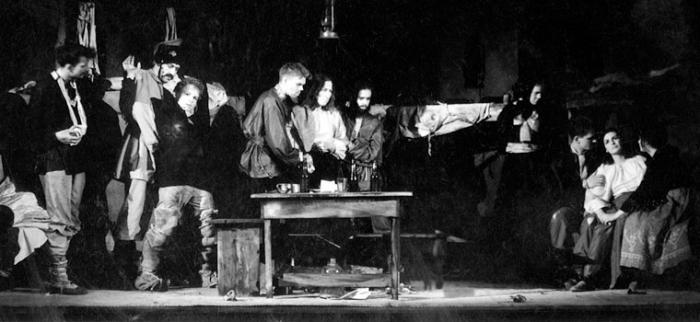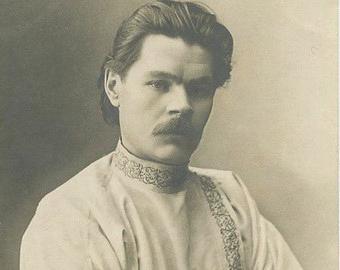Bitter at the bottom is short. M. Gorky. At the bottom. Text of the work
The play contains as if two parallel actions. The first is social and the second is philosophical. Both actions develop in parallel, not intertwining. There are two plans in the play: external and internal.
The external plan. According to the author’s definition, the “former people” live in a night shelter owned by Mikhail Ivanovich Kostylev (51 years old) and his wife Vasilisa Karlovna (26 years old). people without solid social status, as well as working but poor people. They are: Satin and Actor (both under 40 years old), Vaska Pepel, thief (28 years old), Andrei Mitrich Tick, mechanic (40 years old), his wife Anna (30 years old), Nastya, prostitute (24 years old), Bubnov (45 years), Baron (33 years), Aleshka (20 years), Tatarin and Krivoy Zob, hookers (age is not named). Kvashnya, a vendor of dumplings (under 40 years old) and Medvedev, Uncle Vasilisa, a policeman (50 years old) appear in the house. There is a very complicated relationship between them, often scandals. Vasilisa is in love with Vaska and persuades him to kill her elderly husband to be the sole proprietress (in the second half of the play Vaska beats Kostylev and accidentally kills him; Vaska is arrested). Vaska is in love with Natalia, Vasilisa’s sister (20 years old); Vasilisa out of jealousy mercilessly beats her sister. Satin and Actor (the former actor of provincial theaters by the name of Sverchkov-Zavolzhsky) are completely degraded people, drunks, gamblers, Satin is also a sharper. The baron is a former nobleman who squandered his entire fortune and is now one of the most miserable people of the doss house. Tick tries to earn their plumbing tool; his wife Anna gets sick and needs medication; at the end of the play, Anna dies, and the Tick finally descends "to the bottom."
In the midst of drunkenness and scandals, the wanderer appears in the doss house, pitying people. He promises many unrealizable bright future. Anne, he predicts afterlife happiness. Actor talks about a free hospital for alcoholics. Vaska and Natasha advised to leave home, etc. But at the most tense moment, Luke actually runs away, leaving hopeful people. Actor is driven to suicide. In the final, the hostels sing a song, and when Satine hears about the death of the Actor, she says with anger and bitterness: "Eh ... Spoiled the song ... fool!"
Internal plan. Two philosophical "truths" collide in the play: Luke and Sateen. The night shelter is a kind of symbol of the mankind in a dead end, which by the beginning of the 20th century lost faith in God, but has not yet gained faith in itself. Hence the general feeling of hopelessness, the lack of perspective, which, in particular, is expressed by the Actor and Bubnov (pessimist-reasoner) in the words: “And what’s next” and “And the strings are rotten ...” The world has decayed, exhausted, goes to the end . Satin prefers to accept this bitter truth and not lie to himself or to people. Tick he offers to quit work. If all people quit working, what will happen? “They will die of hunger ...” answers the Tick, but by this it only reveals the meaningless essence of labor, which is aimed only at supporting life, and not at bringing any meaning to it. Satin is a kind of radical existentialist, a person who accepts the absurdity of the universe, in which "God died" (Nietzsche) and the Emptiness was exposed, Nothing. Luke adheres to a different world view. He believes that it is a terrible nonsense of life that should cause special pity for man If a person needs a lie to continue his life, he must lie to him, console him. Otherwise, the person will not withstand the "truth" and die. So Luke tells a parable about the seeker of the righteous earth and the scientist who showed him that there is no righteous earth . A lonely man left and hanged himself (parallel with the actor's future death. Luke is not just an ordinary wanderer, comforter, but also a philosopher. In his opinion, a person must live contrary to the meaninglessness of life, because he does not know his future, he is only a wanderer in the universe, and even our earth in space is a wanderer. Luke and Satin argue. But Satin accepts Luke’s “truth.” In any case, Luke’s appearance provokes Satin to his monologue about Man, which he says, imitating his opponent’s voice (a principal remark in the play). Satin does not want to regret and comfort a person, but by telling him the whole truth about the meaninglessness of life, to encourage him to self-esteem and rebellion against the universe. A person, realizing the tragedy of his existence, should not despair, but, on the contrary, should feel his value. The whole point of the universe is one. There is no other meaning (for example, Christian). "Man - it sounds proud!" "Everything is in man, everything is for man."
- About the work
- main characters
- Other characters
- Summary
- Act one
- Act Two
- Act three
- Act four
- Conclusion
- Test of the play
About the work
Appeared in 1902, the work was innovative in genre. In this socio-philosophical drama there is no traditional plot, the action is developed in the dialogues of the characters. The place of events is a doss house for "former" people who find themselves "at the bottom" of life.
Maxim Gorky defined the main question of the play: “What is better, truth or compassion?
What is needed? The problematic of the drama is diverse: the place of a person and his role in life, faith in a person, the legitimacy of the existence of a comforting lie, the opportunity to change his own life.
After reading the summary “At the bottom” on the actions, you can get an idea of the heroes and the main conflicts of the play. The play is included in the program of literature grade 11.
main characters
Kostylev Michael, 54 years old, owner of an overnight house.
Vasilisa - Spouse Kostyleva, 26 years old, Mistress of Ashes.
Natasha - sister Vasilisa, 20 years old. Dreaming of a beautiful future. Because of the beatings of her sister, she goes to the hospital, leaves her, disappears.
Luke - a wanderer, 60 years old, preaching a comforting lie.
Vaska Ash - a thief, 28 years old, a desire to change his life awakens in him.
Tick Andrei Mitrich - “worker man,” a mechanic for 40 years, hopes to return to his former life.
Bubnov - cap, 45 years old. I am convinced that all people on earth are superfluous.
The baron - a former aristocrat of 33 years old, Nastya's cohabitant, is sure that he has “everything in the past”.
Satin - the lodger, about 40 years old, believes that a person should be spiritually free.
Actor - a drunkard, a former actor, not seeing the possibility of change, ends his life by suicide.
Other characters
Medvedev Abram - a policeman of 50 years old, uncle Vasilisa and Natasha. I am convinced - "a person must behave quietly."
Anna - Mite's wife, 30 years old, kind-hearted and calm, died in an overnight house.
Alyoshka - shoemaker, 20 years old.
Tatar, Curve Goiter - movers.
Nastya, the girl of easy virtue, 24 years old, dreams of true love.
Kvashnya - A 40-year-old woman who sells dumplings.
Act one
The action takes place in the morning of early spring in the basement of a doss-house similar to a cave.
Sitting near one of the walls, the Tick picks up the keys to the old locks. In the center at the big dirty table "is hosted" by Kvashnya, the Baron eats bread, Nastya reads a tattered book. For an unwashed curtain on a bed in the corner, Anna coughs. Actor tosses on the stove. Located on the bunks, is going to sew a cap Bubnov.
Turning to the Baron, Kvashnya claims that, having been married, she will never part with her freedom. Mite teases a woman with words that she is lying and will be happy to marry Medvedev, who made her an offer. Kvashnya responds by saying that he brought his wife to a pulp.
The baron, snatching a book from Nastya, and, having read the name “Fatal love”, laughs.
Anna asks to stop screaming and quarreling, let her die peacefully.
Satin, Bubnov, Actor and Tick have a leisurely conversation. Satin says he was a cultured person before. Bubnov recalls that his profession is a furrier and once he had “his own institution”. The actor thinks that the main thing in life is not education, but talent.
Kostylev appears, looking for his wife. He knocks on the door of Ash's room (the room is fenced off by thin boards in the corner of the doss house), about to talk, but Ash drives him away. Kostylev leaves.
From further conversation of the basement inhabitants, it becomes clear that Ash has an affair with the hostess host Vasilisa.
Satin asks for money from Ash, he gives, and Satine talks about money and work. He believes life is good when work is pleasure, and if work is a duty, then life becomes slavery.
Actor and Satin go.
Natasha appears, with her is a new lodger, Luka. Ash flirts with Natasha, but she does not accept courtship.
Alyoshka drunk enters, he cannot understand why he is worse than others, why he is being driven everywhere.
Ashes, referring to the Tick, says that he "squeaks in vain." Tick says it will break out of here, does not want to live, like everyone here - "without honor and conscience." Ashes, on the other hand, thinks that the people in the bunkhouse are no worse than the Tick. Ash with the Baron go.
Vasilisa appears, she expels the drunk Aleshka, scolds the guests for dirt. Then she wondered if Natasha came in and spoke with Vasily. Leaves.
In the hall there is a noise and screams: Vasilisa beats Natasha. Medvedev, Kvashnya and Bubnov run to separate the sisters.
Act Two
The action of the play takes place in the same setting. Several guests are busy playing cards, they are watched by the Actor and Mite. Medvedev and Bubnov play checkers. Luka sits beside Anna's bed.
Talking with Luka, Anna complains about her life. The elder calms her, promising paradise and rest after death.
The actor is going to "recite couplets" Luka, but discovers that he forgot the poems. He laments that for him everything is over - he “drank the soul”. Luka replies that not everything in the life of the Actor is lost: there are free hospitals for drunkards, but do not remember which city.
He persuades the Actor to suffer and refrain from drunkenness. “A man can do everything ... if only he would like to,” says Luke.
Moody Ash comes. He turns to Medvedev, asking if Vasilisa’s sister has beaten severely. He refuses to speak, noticing that it is not his, the thief, business. Ashes in response threaten to tell the investigator that "Mishka Kostylev and his wife" knocked him to theft and bought stolen goods.
Luka tries to interfere in their conversation, but Ash asks why Luka is lying, telling everyone that everything is good. Luka convinces Basil that instead of searching for the truth, he needs to go to the “golden side,” Siberia, that’s where he can find his way.
Vasilisa enters. She speaks with Ash, and he confesses that Vasilisa is tired of him - there is no “soul” in her. Vasilisa proposes Ash to marry her sister in exchange for the murder of her annoying husband.
Kostylev enters, a quarrel breaks out between him and Vasily, but Luka prevents the fight. He advises Ash to not deal with Vasilisa, but to go away from the doss house with the one that pleases the thief - Natasha.
A wanderer, looking behind the curtain where Anna is lying, discovers that she is dead.
Gradually, all the residents of the doss house are gathering at Anna’s bed.
Act three
The action is on the “waste ground”, cluttered up and overgrown with weeds of the doss-house.
Nastya tells the audience a story of her love. Bubnov and Baron laugh at her story, not believing, and the girl passionately proves that she experienced true love. She is crying. Luka reassures her, says that since she herself believes, that love was so, and her roommate laughs, because there was nothing real in his life.
The inhabitants of the "bottom" talk about the truth and lies.
Natasha says that she is inventing and waiting for someone “special” or something “unprecedented”. Although, what to expect - she does not understand, “it's bad for everyone to live.”
Bubnov believes that people often cheat in order to "tint up the soul," he himself does not see the point of lying, it is better for him "to throw down the whole truth as it is!
Why be shy? "
Tick people hate and really him to anything. Having said that, he runs away
Ashes appear, join in the conversation. He asks Luka why he is deceiving, saying that it is good everywhere. Luka replies that “it’s not always true that you will cure the soul,” so a person should be pitied. He says that he will soon leave the doss house.
Ash calls Natasha to leave with him, confesses of love, promises to give up theft. He feels that he needs to change his life, “living in such a way that I can respect myself.” Natasha is in thought, but still decides to believe him.
Kostylev and his wife are coming up. Vasilisa (she heard the conversation between Ash and Natasha) tries to push Ash and husband away, but Luka reassures Basil.
Kostylev speaks with Luka, says that a person should live by the rules, and all good people have a passport. Luka openly says that he thinks: Kostylev will never change, because he, as a land unsuitable for harvest, is good for nothing.
The owners of the doss house chase away Luka, and he promises to leave at night.
Bubnov tells Luka that “it is always better to leave on time” and tells his story.
Satin and Actor, arguing about something, go to the basement. Satin says that the Actor will not leave anywhere and demands to say what Luke promised the Actor. The stranger asks how he could end up in a sateen dock house. He reluctantly says that he was imprisoned because of his sister: “he killed the scoundrel in quick temper and irritation,” and after the prison all roads are closed.
A gloomy Tick enters - he had to sell all the tools to bury Anna and did not understand how to live.
From the Kostylevs' apartment, Natasha’s scream is heard: “They are beating! They are killing! ” Actor and Satin come out to figure out what's going on. There are separate voices, according to the remarks, it is clear that the guests are trying to separate Vasilisa and Natasha.
Kvashnya and Nastya appear, help Natasha to walk - she is beaten and her legs are scalded with boiling water. Behind them are Kostylev, Vasilisa, the inhabitants of the doss house. Appearing Ash sees Natasha and beats Kostyleva with a sweep. He falls. Vasilisa shouts that they killed her husband, points to Ash.
Vasily says that Kostyleva herself was urging him to kill her husband.
Natasha hysterically accuses her sister and Ash in a conspiracy and, almost losing consciousness, asks to take her to jail herself.
Act four
Early spring. Night. Basement doss house. At the table Tick, Nastya, Satin, Baron. On the stove - Actor. In the corner, where the room was Ashes (now partitions are broken), lies Tatar.
The inhabitants of the basement recall Luka, who disappeared during the turmoil around Natasha and Kostylevo. Nastya believes that he understood everything and saw everything. He called his interlocutors "rust". Tick agrees - the old man is good, pitiful. Tatarin believes that Luke lived under the law "Do not hurt a person."
For Satin, the “old man” is “like a crumb for the toothless,” besides Luka embarrassed the minds of the inhabitants of the shelter.
Baron calls Luka a charlatan.
Nastya, who has become nasty, and life, and people want to go "to the ends of the earth." The baron, offering the girl to take the Actor with him, mocks his dream to recover.
Tick notes that wanderer Luke "beckoned somewhere, but he did not say the way." In his opinion, he “rebelled very much against the truth. It is true - and without it - there is nothing to breathe. ”
Satin, in arousal, orders “to be silent about the old man” - he, unlike everyone, understood that “the truth is a man” and deceived out of pity for people. The stranger influenced his attitude to the world as "acid to the old and dirty coin."
Talk about killing Kostylevo. Once in the hospital after bullying her sister and leaving her, Natasha disappeared. Everyone thinks that Vasilisa will get out, and Ash will get into prison, if not to penal servitude, then.
Satin argues that the person must be respected, and "not to humiliate him with pity." Baron admits that he lives as in a dream, not seeing and not understanding the meaning of life.
The actor suddenly gets off the stove and runs out of the basement.
Enter Medvedev with Bubnov, for them - the other inhabitants of the doss house. Someone settles for the night, a few people sing. Swings open the door. The Baron is screaming from the doorway - the Actor hanged himself in the wasteland.
Satin says: "Eh, ruined the song, dur-rak!"
Conclusion
The play "At the Bottom" of Gorky lives and finds his readers and viewers for more than a century, attracting the ambiguity of the questions posed, prompting again and again to think about what faith, love and what human capabilities exist in a person's life. Giving only a general idea of the play, a brief retelling of “At the Bottom” suggests the reader’s further work with the full text of the drama.
The play contains as if two parallel actions. The first is social and the second is philosophical. Both actions develop in parallel, not intertwining. There are two plans in the play: external and internal.
The external plan. According to the author’s definition, there are “former people”, that is, people without solid social status, as well as working, but poor people, live in a night shelter owned by Mikhail Ivanovich Kostylev (51 years old) and his wife Vasilisa Karlovna (26 years old). They are: Satin and Actor (both under 40 years old), Vaska Pepel, thief (28 years old), Andrei Mitrich Tick, mechanic (40 years old), his wife Anna (30 years old), Nastya, prostitute (24 years old), Bubnov (45 years), Baron (33 years), Aleshka (20 years), Tatarin and Krivoy Zob, hookers (age is not named). Kvashnya, a vendor of dumplings (under 40 years old) and Medvedev, Uncle Vasilisa, a policeman (50 years old) appear in the house. There is a very complicated relationship between them, often scandals. Vasilisa is in love with Vaska and persuades him to kill her elderly husband to be the sole proprietress (in the second half of the play Vaska beats Kostylev and accidentally kills him; Vaska is arrested). Vaska is in love with Natalia, Vasilisa’s sister (20 years old); Vasilisa out of jealousy mercilessly beats her sister. Satin and Actor (a former actor of provincial theaters by the name of Sverchkov-Zavolzhsky) are completely degraded people, drunks, gamblers, Satin is also a cheater. The baron is a former nobleman who squandered his entire fortune and is now one of the most miserable people of the doss house. Tick tries to earn their plumbing tool; his wife Anna gets sick and needs medication; at the end of the play, Anna dies, and the Tick finally descends "to the bottom."
In the midst of drunkenness and scandals, the wanderer appears in the doss house, pitying people. He promises many unrealizable bright future. Anne, he predicts afterlife happiness. Actor talks about a free hospital for alcoholics. Vaska and Natasha advised to leave home, etc. But at the most tense moment, Luke actually runs away, leaving hopeful people. Actor is driven to suicide. In the final, the hostels sing a song, and when Satine hears about the death of the Actor, she says with anger and bitterness: “Eh ... Spoiled the song ... fool!” The inner plan. Two philosophical "truths" collide in the play: Luke and Sateen. The night shelter is a kind of symbol of humanity who has found itself in a dead end, which by the beginning of the 20th century. lost faith in God, but has not yet gained faith in itself. Hence the general feeling of hopelessness, lack of perspective, which, in particular, is expressed by the Actor and Bubnov (pessimist-reasoner) in the words: “And what’s next” and “And the strings are rotten ...” The world has decayed, exhausted, goes to the end . Satin prefers to accept this bitter truth and not lie to himself or to people. Tick he offers to quit work. If all people quit working, what will happen? “They will die of hunger ...” answers the Tick, but in so doing it only reveals the meaningless nature of labor, which is aimed only at supporting life, and not at bringing any meaning to it. Satin is a kind of radical existentialist, a man who accepts the absurdity of the universe in which "God died" (Nietzsche) and revealed Emptiness, Nothing. A different view of the world adheres to Luke. He believes that it is precisely the terrible nonsense of life that should evoke a special pity for a person. If a person needs a lie to continue life, he must lie to him, to console him. Otherwise, the person will not withstand the "truth" and will die. So Luke tells the parable about the seeker of the righteous earth and the scholar, who on the map showed him that there is no righteous earth. The offended man left and hanged himself (parallel with the future death of the Actor). Luke is not just an ordinary wanderer, a comforter, but also a philosopher. In his opinion, man is obliged to live contrary to the nonsense of life, for he does not know his future, he is only a wanderer in the universe, and even our earth in space is a wanderer. Luke and Satin argue. But Satin somehow accepts the "truth" of Luke. In any case, it is the appearance of Luke that provokes Satin to his monologue about the Man, which he utters, imitating the voice of his opponent (a principal remark in the play). Satin does not want to regret and comfort a person, but by telling him the whole truth about the meaninglessness of life, to encourage him to self-esteem and rebellion against the universe. A person, realizing the tragedy of his existence, should not despair, but, on the contrary, should feel his value. The whole point of the universe is one. There is no other meaning (for example, Christian). "Man - it sounds proud!" "Everything is in a man, everything is for a man."
First act
The action takes place in a doss house. This is a cave-like basement. The big Russian stove, on which the Actor is busy and coughing, is about forty years old.
Behind the canopy, Anna, a thirty-year-old woman, coughs hysterically and painfully. Her husband, a locksmith Tick, works at the anvil in the same basement. Nastya, a girl of twenty-four, is reading a disheveled book at the table. Baron is chewing black bread. Kvashnya, a forty-year-old merchant dumplings, cooks up.
Satin (he is also forty years old) is lying on the bunk, he just woke up and “growls”.
The day begins with an argument, a scream, a fight. Argue, who sweep the floor. The actor refuses: he, you see, can not breathe dust. He proudly states:
My body is poisoned by alcohol!
Baron mocks Nastya, takes away her book and laughs at the title: "Fateful love."
Serious-hearted Kvashnya offers hot ravioli to Anna, but she refuses - why she needs to eat, she dies anyway. "Poisoned by alcohol" The actor drags out a consumptive Anna in the canopy - breathing air, stuffy in the basement.
Satin can not remember why he was beaten yesterday. It must be for playing cards. From nothing to do, he says into space rare and incomprehensible words: "macrobiotic", "transdental". He was once a telegrapher, whoever he was, he read smart books, but he forgot everything.
Fifty-six-year-old Kostylev, the owner of the doss-house, descends into the basement.
He is looking for his wife Vasilisa, who is twice his age. Kostylev hypocritically argues about kindness, about God, reproaches Tick that he beat his wife to death ... Kostylev is greedy, all his arguments are a comedy in which no one believes.
The owner of the shelter knocks on the door of the room where the young thief Vaska Pepel lives. The husband suspects that his Vasilisa is at Vaska. Nightmen look at each other:
He will open, and she - there.
But this time the young woman at Ash was not, it cost.
Vaska sends Kostylev for the money he owes to a thief for a stolen watch.
Nightmen begging for money from a thief - who is a penny, who is a two-dollar one. The tick is sullen: he has a grim pride that he has been working since his early years, and all the rest - “without honor, without conscience ...”
Satin:
Job? Do so that the work was pleasant to me - I, maybe, will work ... Yes! May be! When work is pleasure, life is good! When work is a duty, life is slavery!
Natasha, the sister of Vasilisa, leads a new resident - an old man named Luka.
The stranger listens to the conversation that only rich people need honesty, and the poor need only a burden.
Luke:
I do not care! I respect the crooks, in my opinion, not a single flea is not bad: everyone is little black, everyone jumps.
Kind girl Natasha, now Anna has been buried in her kitchen, ask Tick to be more nice with her wife - she didn’t have much time left. She likes Vaska Ash much more than her married sister, only Vasilisa is “a cruel woman, she will not give her back.”
Ash complains that "it is boring ...". Tosca rolls. He is trying to make the Baron stand on all fours and bark for fifty dollars.
Baron:
I myself know that I have become almost worse than you! You would then make me walk on all fours when I was uneven to you ...
I ... used to ... wake up in the morning and, lying in bed, drink coffee ... coffee! With cream ... Yes!
Baron clings to the "new" - to Luke: "You, old man, who is this? Wanderer? Do you have any documents? ”
“We are all strangers on earth ...” the old man responds evasively. “They say that the earth is our wanderer in the sky ...”
The aphoristic, peculiar, somewhat crafty speech of the old man attracts attention, disposes of himself mentally. Luka and the Baron quickly reconciled, agreeing that all the papers (documents) are no good.
A drunk young shoemaker Alyoshka tumbles in, brawling. Behind him - the mistress of Vasilisa, drives the shoemaker away, speaks evil to everyone, finds fault with what is not marked, threatens to expel everyone.
In fact, she is looking for Vaska, but she is not. Moreover, Alyoshka used to tease her with the fact that Vaska wants to leave her and take Natasha for herself. Vasilisa leaves.
Bubnov:
How many atrocities in it, in this woman ...
Nastya:
Ozveresh from such a life. Tie every living person to a husband like her ...
Again, controversy, contention ...
Luka finds a broom in the passageway and sweeps the room.
Medvedev, a policeman, Uncle Vasilisa and Natalia, goes down to the basement. Kostylev soon calls him: Vasilisa Natasha kills. All run to the noise, except for Luke, who comforts Anna. The patient says that he looks like her father - the same gentle, soft.
Myali much, because and soft, - laughs Luke rattling laughter.
Second act
In the basement is a card game. The Baron beats the Tartar, distorting the cards and hiding them in his sleeve. The actor complains to Luka that he has drunk his memory.
Luke:
From drinking now cure, hear. Free, mate, treat ... Such a hospital is designed for drunkards ... Even glad if the drunkard wants to be treated ...
Actor:
Again? Live again? After all, can I?
Luke:
Man - everything can ... If only he wanted ...
He comforts Luke and Anna: “If you die, you will rest. Because here - where is the person to rest? The Lord will say take her, Anna, to heaven ... ”Police officer Abram Medvedenko Luka calls“ Underder ”that it’s very flattering - he’s not a non-commissioned officer yet.
Is Vaska Ash. Threatened to take Natasha. Luka advises him to quit these places and go to Siberia. Do not wait until arrested and exiled, but go yourself, start a new life. “The good side is Siberia! Who is in power yes in mind, to him there - like a cucumber in a greenhouse. ”
Ash objects: "You're lying, old man!"
Luke:
And why do you really need pain? She, really, maybe, butt for you ...
Vasilisa appears. She calls Vaska Ash to talk. He answers her honestly: "And I lived with you, and everything ... And I never liked you ... A woman should have a soul ..."
Vasilisa replies that in Vaska she loved her hope that he would “pull her out”, save her from the blasphemy of living with her old unloved husband.
You are not a nail, I am not ticks! - responds Vasily.
Vasilisa asks Ash to deliver her from her husband — not himself, even through her comrades.
She will remain a complete mistress, Natasha, the former lover, is getting married, will give you money ... And let them leave! Because Vasilisa cannot see her younger sister - she breaks down, hits.
Kostylev appears. He scolds his wife a beggar, a pig. Vaska shakes him by the collar ... The case may reach murder. But then Luke intentionally loudly starts to mess around. This saves Kostylev from Doom, and Vaska from sin and arrest.
Luka advises Ash to drive Vasilisa. From the speeches of the old man it becomes clear that he lived a rich and not always righteous life. And “women knew” a lot - “bald head because of these very different women”, and, as Vaska suspects, maybe someone killed ...
At that moment, Anna terribly wheezes and Luke reads a memorial prayer over her: “The spirit of your newly reposed slave Anna and the world accept ...”
I do not like dead! - shudders Vaska.
Why love them? Love is necessary for the living, Luke responds.
He gives similar advice to Natasha:
You are not afraid of the dead ... Fear of the living is necessary ...
The tipsy Actor returns. He remembered the poems that
was going to recite the old man.
This is a translation of Beranger:
Lord If the truth of the holy world will not be able to find the way, Honor the madman who cast a golden dream to Humanity!
The actor wants to find a hospital with “marble floor”, to recover, and start a new life. Here are just spring wait, real spring ...
"Fata Morgana! Lied to you old man! There is nothing! No cities, no people ... Nothing! ”Satine shouts back.
Third action
Early spring. Only melted snow. Nastya, Natasha, Luka, Baron are sitting on logs in the yard littered with various rubbish. Mite lies on a pile of wood. From the basement window "looks out the face of Bubnov."
Nastya tells the story of her love, where there is a meeting at night in the gazebo in the garden, and the words of the student in love “Beloved My Love” and “Levvert” ... Here are just the names she confuses: her Raoul last time was called Gaston ...
Her mate Baron laughs at her: the whole story is read from the book “Fatal Love”. But Luka leads her away: “If you believe that you had such love, it means that it was ...”
Why are you so kind, grandfather? - asks crying Nastya.
Luka tells her a story. Storozhil he somehow cottage with a gun. Two men climbed through the window with an ax.
At gunpoint thieves threw axes. Luka forced them to break branches and ... carve each other. And they asked for the bread of Christ for the sake of - they don’t remember how much they don’t eat. And they would not dare to plunder, but whoever you ask for, nobody gives.
Luka fed the travelers. "Good men are both ... Though runaway convicts ..." So they spent the whole three winter cottage and watched.
“The prison will not teach good, and Siberia will not teach ... And man will teach ...” - such a conclusion is made by Luke.
The wanderer tells a parable. There lived one person by faith in the righteous land, where people help each other, everything is nice and good for them. And all he was going to go into this land.
Only one scientist unfolded geographical maps, looked at it for a long time and said that there is no such righteous land in the whole earth. Nowhere! And what did this man do? He struck the scientist in the ear, and he went home - and he hung himself. Because you can not live without faith in the best person.
The thief Vaska is imbued with this story: if they had not called him since his childhood only a “thief”, he would have lived, maybe otherwise. He calls Natasha with him, because she is a “good girl, strict”. And he needs this to guide him on the right path and to keep in check his hot nature.
Luka inserts his own word: “Do not hesitate, dear! He will not offend you ... He needs you more than he does to you! ”Kostylev and Vasilisa tell Luka to get out immediately - he is embarrassed by everyone, there is no peace. And he has no passport, either.
Vasilisa again rushes to beat Natalia and knocks over her boiling samovar. Vaska Ashes rushes to defense - beats Kostylev and ... He falls dead. Vasilisa yells: “Knit him!”
Natasha wildly shouts: "Vasilisa and her lover - they are in agreement!"
Fourth act
Basement again. The partitions of the room where Vaska Ashen lived were torn down. There now lives a Tatar. The conversation is about Luke. Nastya says that she loved the old man for his ability to instill faith in the good. “He was compassionate ...” - supports her Tick. "He was for you - like a crumb for toothless ..." - Satin scoffs.
"The old man was good ... The law in the soul had ..." - says the Tatar. “He didn’t like the truth ... The old man is ... True - what is the truth here? And without it there is nothing to breathe ... ”, sighs Tick.
Satin (punching the table):
What is truth? Man - that's true! He lied ... But this is out of pity for you! There are many people who lie out of pity for their neighbor ... Beautiful, inspired. Excitingly lying! There is a consoling lie, a reconciling lie. A reconciling lie ... Whoever has a weak soul - those lies are needed.
Falsehood is the religion of slaves and masters. True - the god of a free man!
Satin says that once in a conversation the old man told him that all people live "for the best man." Therefore, we need to take care of each other - and especially children. “Man is great! That sounds proud! Work? For what? To be full? Man - above satiety! "
And again in the doss house crying rises, quarrels flare up ... The actor slowly goes out. Bubnov announces that he has a name, and brings alcohol.
Everybody gets drunk, not excluding Medvidenko’s “budoshnika”. Sing the song: "The sun rises and sets, and in my prison is dark ..."
Bubnov appears on the threshold:
Hey you! Come here! On a vacant lot ... there ... Actor ... Strangled!
Oh, spoiled the song, dur-r-cancer!
M. Gorky’s play "At the Bottom" was written in 1902. It is a socio-philosophical drama. Gorky was able to surprisingly accurately portray the difficult life of the social lower classes. In addition, the author raises an important philosophical problem. What is truth? Is truth always and everywhere needed, or in some cases it is better for a person to lie? He answers these questions throughout 4 acts of his work. Summary "At the bottom" will help to understand the ideological and artistic content of the drama.
Composition
The play consists of four actions. Unlike the plays of the previous era, Gorky does not divide them into appearances. It also violates the trinity characteristic of the classic drama. Only one place of action remains - a dock. The time interval depicted by Gorky is rather long.
Summary. "At the bottom" as a social drama
Of course, a retelling of this work will, by and large, reveal only the social layer. Since in order to understand its philosophical content, it is necessary to turn not to action, but to the dialogues of heroes. In order to reveal his attitude to such philosophical categories as truth and lie, Gorky attracts different images. "At the bottom" is the drama of life, transmitted through the communication of heroes. 
Act 1
Begins with a description of the bunkhouse. Before us is a beggarly dwelling, where the peeled walls, instead of beds, are, and the ceiling puts pressure on the inhabitants. On the bed is Anna dying from consumption. The remaining residents of the doss house are arguing about who should be on duty. From the dialogues of the characters, we understand that the Actor is drunk, he says that his body is poisoned by alcohol. Satin also has a passion for difficult words, and he knows a lot of them, because he used to work in the telegraph and read a lot. Ash is a thief who easily gets money. Tick - a locksmith who hopes that after the death of his wife Anne, he will be able to leave the doss house. Vasilisa, the wife of Kostylev's owner, is in love with Ash and pursues him. And Ash does not breathe unevenly to her sister Natalia, who her older sister is terribly tyrannical. Summary "At the bottom" can not convey all that is happening in the doss house. People do not understand each other, do not support, although they are in the same position. On the contrary, they mock each other, tease, insult and be rude. There is a new resident - Luke. He is a wanderer, elderly, Natasha leads him. 
Act 2
Residents play cards. Only Luke and Anna are indifferent. She complains to the elder about her life, she is afraid that after her death she will suffer. But Luka comforts her, says that "there" she will be calm, that death is a consolation for such suffering people. The rest of the doss house do not care about Anna's death throes. They hear what Luke says and accuse him of lying.
Vasilisa, in the meantime, offers Ash to kill her husband, then she will give him enough money so that he will leave with Natasha. Luka heard this conversation and advises Ash to take his beloved and go to Siberia, because there he will be able to start a new life. To the actor, the wanderer tells about the city, in which there is a clinic, where they are treated for drunkenness for free, but he forgot the name of this city.
Act 3
Relationships in the doss house escalate. Tick, Baron, Bubnov and Ashes accuse Luke of lying. Tick hates everyone and everything, he does not want to hear either the truth or the false promises of Luke. The truth is that they have no life. Ash and Bubnov argue that a person can not lie.
Luke tells the story of the righteous land. One person believed that such a land exists. but one scientist revealed to him a secret, the man was upset and hanged himself. Luke argues with this that the truth cannot be cured, but a lie can be cured.
This is the central problem in the play “At the Bottom”. Characteristics of monologues of Luke, Ash, Bubnov and Satin helps to figure out which side the author is on. However, we only know this in the fourth act.
Ash offers Natasha to leave with him. Vasilisa is furious. Tie a fight. Vasilisa scorched Natasha's feet with boiling water. Ash, who stood up for her, kills Kostylev in the heat of a fight. Luka quietly disappears. 
Act 4
The fourth act is indicative of understanding the ideological plan of the play "At the Bottom". Gorky completes the study of the truth question here. Residents dossier discuss what happened. First of all, they are interested in the disappearance of Luke and his behavior. Practically everyone agreed that Luka is a kind person who deceived them out of compassion. Most intercedes for the wanderer Satine. It is in his mouth that Gorky puts his thought about the truth. Satin utters a long monologue in which he justifies Luka, but does not agree with him. Residents give birth to a song and suddenly find out that the Actor has committed suicide.
Monologue of Satin
Of course, Satine’s humanist affirmation makes sense. For the inhabitants of the shelter, the truth can be the impetus for committing acts, for people to act, to change their lives. Luka just relieved for a moment of suffering, not giving the opportunity to recover.
The complex composition of the drama can be traced by making a plan.
"At the bottom": a plan for the acts
1. Description of the doss house, its inhabitants.
2. Playing cards, disputes of residents of the doss house. Anna is dying. Luka appears.
3. Luke gives everyone false hopes.
4. Natasha is burned with boiling water. Brawl, accidental murder of Kostylev.
5. The disappearance of Luke. Ash under investigation. Natasha is gone.
6. Satin pronounces a life-affirming monologue.
7. The actor commits suicide.
The plan "At the bottom" shows that events occur in the play, it is quite dynamic, it is interesting to read it. 
findings
The play can be seen as a social or philosophical drama. Bitter introduces a number of innovations in the genre of drama, it complicates the action, expands the temporal boundaries. A hymn to a person - so capaciously you can call the play "At the Bottom" Gorky puts his thought about this into the mouth of his hero Satin. At the beginning of the 20th century, this work sounded particularly acute and topical. After all, a lot of people lived in such shelters, each with its own complex fate and joyless future.






